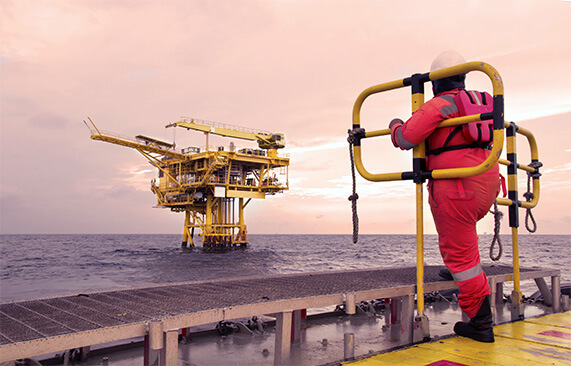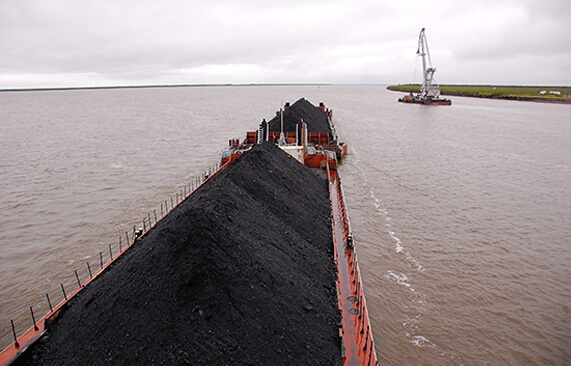Houston Maritime Injury Lawyers
(281) 283-8500Maritime accidents – like those on oil rigs, while at port, or commercial vessels at sea are a lot different than other work accidents that happen on land.
Accidents at Sea or Port Houston – You Need A Maritime Lawyer
Injured in a maritime accident? Schedule a FREE consult with a Houston maritime injury lawyers to get all the facts. Call 281-283-8500 or fill out our online form.
An experienced maritime attorney like Scott Krist can be the difference in maximizing your claim and getting everything you deserve. Attorney Krist has been fighting for injured seamen for more than 25 years and won some of the largest recoveries in Texas.
What Makes Maritime Accidents Different?
A unique set of laws applies to maritime injuries. Several laws might apply in a maritime claim that do not apply to accidents on land. Sometimes referred to as admiralty laws, they are designed to protect specific situations and employees. For example, someone injured while a crew member on a ship files a different lawsuit than someone hurt in a car crash.
The main difference is the damages you’re able to recover under maritime law. Additionally, some injuries that occur dockside, like while unloading containerships at Port Houston may fall under maritime law.
The Krist Law Firm Explains Maritime Law
Why Hire a Houston Maritime Lawyer?
As you can see, Maritime laws are complex. Let Houston maritime attorney Krist and his team help you understand the legal concepts and walk you through the process to get all the compensation you deserve. This could be what gets you paid for the time you missed and able to pay the medical bills that continue to pour in.
Working with a lawyer without maritime can mean leaving money on the table. But at The Krist Law Firm, P.C., our Houston maritime accident lawyers have extensive experience in this field and do not let our clients be shortchanged.
How Krist Helps Injured Seamen & Maritime Workers
Our Houston maritime attorneys have a history of getting results for injured maritime workers, so they get maximum compensation. This includes one of the largest published recoveries in Texas for a single plaintiff. In this case, we got a $15,120,000 award for a man who suffered major injuries after a mooring cable snapped and struck his head.
Our team of award-winning lawyers has the knowledge, experience, and resources to win even the most challenging maritime cases. Whether you’re injured on a ship at sea, on an oil rig, or at Port Houston, we have a network of the best medical, engineering, and maritime industry experts in the nation.
We are proud of our work and track record of representing people injured while working in the hazardous maritime industry.
A Krist Maritime Attorney Will:
- Help you complete the accident report for your employer.
- Determine whether you are a seaman under The Jones Act.
- Confirm the status of the vessel at the time of the injury.
- Gather evidence about its seaworthiness.
- Investigate the crew members and their training.
- Assess the cause of your accident and injuries.
- Review any paperwork from your employer, including any waivers or offers.
- Analyze your right to file a legal claim.
- Determine how long you have to file a lawsuit.
- File a lawsuit against a negligent employer.
- Negotiate an appropriate settlement or prepare for trial.
Let Us Get Your Medical Bills Paid
If you’ve been injured in a maritime accident, you may have significant medical costs and be confused about what to do next. A Houston maritime attorney from the Krist Law Firm, P.C. will be a valuable resource as we fight to get you a full financial recovery.
Call 281-283-8500 for a free consultation. Let us work what your doctors, compile your medical bills, and determine what you’ll need to pay for all the care you need.
What are Maritime Injury Cases Worth?
You may be able to file a lawsuit under federal maritime laws for compensation for your injuries. A Houston maritime lawyer can explain your legal options and help you decide on a course of action.
If you’ve been injured in a Houston maritime accident, whether in the Gulf, at the Port of Houston, Bayport Terminal or while dockside, you may be entitled to the following damages:
- Medical costs
- Loss of earning capacity
- Physical pain
- Mental anguish
- Physical limitations
- Disfigurement
Additional Compensation for Injured Seamen
- Maintenance and Cure – When a maritime worker is hurt on the job, the worker has the right to “maintenance” payments for expenses such as food and housing. The worker also has the right to “cure” which includes medical costs for treatment until the worker reaches their maximum improvement. This is similar to workers’ compensation, but specifically for people covered by the Jones Act. There are no fixed amounts. Instead, payments are determined based on your circumstances.
- Vocational Rehab – Like typical workers’ comp, if you were injured in an offshore accident, you may be entitled to compensation for vocational rehabilitation services. This includes re-employment evaluation, counseling, and training.
- Disability – You may also deserve temporary and permanent disability payments for lost wages.
Your Houston Maritime Injury Claim
Because maritime laws are so complex, it’s important to have an experienced Houston maritime lawyer working for your interests. There may be large shipping companies and their insurance companies working against you, but The Krist Law Firm, P.C. can make sure you’re protected. We will explain the maritime and admiralty laws that apply and what to expect.
Maritime Lawsuits & When to File
In most maritime accident claims, filing a lawsuit is a necessity. The Jones Act is not like a workers’ comp claim, which is an administrative process you handle with your employer. The Jones Act requires a lawsuit and to prove your employer’s negligence to get compensation.
Maritime Settlements
Most maritime injury claims settle with a negotiated settlement. But this is not guaranteed. It would be best if you worked with a maritime attorney prepared to take your case to court and have a history of maritime litigation success.
Proving a Maritime Injury Claim
When you file a personal injury lawsuit, typically you allege that someone was negligent and that you deserve compensation for your injuries and losses.
Maritime Negligence
When someone is negligent in a maritime case, that means the person or organization acted without taking reasonable care — or failed to act reasonably — to protect others from foreseeable harm.
To prove that you’re owed compensation, you must establish:
- You suffered an injury or loss
- Someone else caused your injury or loss
- The other person failed to exercise reasonable care and caused your injury or loss
How We Make Your Case for Maritime Comensation
Evidence is critical after a maritime accident. At The Krist Law Firm, P.C., our maritime injury lawyers handle these cases every day. We know how to investigate, so nothing gets missed and what it takes to make large companies respond to our demand for max compensation.
Let our Houston maritime attorneys investigate your accident and collect evidence that allows us to build a strong case on your behalf. If the vessel was unseaworthy, we’ll find it. When employers didn’t properly train other maritime worker’s, we’ll uncover it. Everything we do at The Krist Law Firm will be in pursuit of proving your case and the compensation you need.
Whenever possible, maritime employees should act quickly after an accident. Here are some things that may help your Houston maritine claim:
- Take photos of the scene before the employer can correct any dangers or defects
- Seek immediate medical attention from an independent provider
- Report the accident to a supervisor
- Document all injuries, no matter how inconsequential they may seem
- Make note of any faulty equipment, such as defective lighting or improperly labeled pipes
- Talk with witnesses who saw the accident or can attest to the vessel’s unseaworthiness.
Maritime & Admiralty Laws
Maritime or Admiralty Law is the body of legal statutes covering issues on navigable waters. Navigable waters are used for interstate or international commerce and include interconnected systems of lakes, rivers, seas, and oceans.
The primary navigable water body near Houston is the Gulf of Mexico, although rivers, lakes, and shipping channels that connect to the Gulf and are also used and would be considered navigable under maritime law.
Your Rights After a Maritime Accident
As a working seaman, you have certain rights under The Jones Act and other maritime and admiralty laws.
Injured seamen are entitled to:
- A seaworthy vessel
- Reasonably safe work environments
- An adequate number of crewmembers
- Properly trained crewmembers and captain
- Safety guards and rails
- Fire suppression systems and equipment
- Elevators and hoists
- Sufficient food and water
- Safe living quarters
- Properly stored cargo
- Legal counsel
- Compensation for injuries
- Punitive damages if maintenance and cure is refused.
Houston Maritime Accidents & Injuries
Maritime and dockside jobs are dangerous.
Companies often fail to properly train employees who are forced to work for long hours while at sea for weeks at a time. Insufficient manpower and inadequate tools are frequent problems, forcing workers to extend themselves. Jobs in the oil and gas industry also have higher injury and fatality rates compared to other industries, according to the U.S. Centers for Disease Control and Prevention.
Injuries While at Port
Injuries that occur onshore at harbors, shipyards, and other port-based locations still fall under maritime and admiralty law. These often involve cargo hauling, cranes and other large equipment, and mooring lines.
Equipment-Related Injuries
The equipment used in the maritime industry involves regular inspection and maintenance. When repairs are not performed properly, and unsafe conditions exist, you are at risk due to falling objects and broken equipment. Having inadequate tools to complete a job is a frequent problem and can be dangerous to workers.
Ship Accidents
Accidents due to a poorly trained crew, unseaworthy vessels, and collisions occur in the Gulf of Mexico and beyond. If you were injured in a ship accident, you have a right to compensation from employers or those who are at fault.
Mooring Line Accidents
A mooring line may cause a catastrophic accident that results in serious or fatal injuries for nearby dock workers. They can pose deadly risks to port, harbor, and dock workers.
Insufficient Manpower
A common problem both onshore and offshore involves manpower that is insufficient or workers who are not properly trained. When workers must compensate for insufficient manpower, people get injured.
Houston Maritime Injuries
Burns — Burns are physically and emotionally painful, and they often come with a slow, difficult recovery. At The Krist Law Firm, P.C., we see far too many maritime burn injury claims, including those involving:
- Explosions on vessels or oil rigs
- Combustible fuel explosions
- Ruptures in high-pressure gas lines
- Engine room fires
- Malfunctioning equipment
- Faulty fire prevention systems
- Welding accidents
- Steam pipe ruptures
- Electrical accidents
Chemical Exposure — Texas maritime employers and vessel owners have a legal responsibility to maintain a safe workplace free from toxic chemicals and fumes. Without proper safety policies and equipment, workers may experience:
- Respiratory problems
- Lung damage
- Asphyxiation
- Lung cancer
- Brain injuries
- Neurological damages
- Hydrogen sulfide poisoning
- Rashes
- Chemical burns
- Allergic reactions
Head Injuries — Maritime workers are especially vulnerable to head injuries, whether from falling on a slippery deck, being struck by falling objects, or other types of maritime accidents. Sometimes the effects of a head injury are immediately noticeable, but other times symptoms may not appear until much later. Workers struggling with maritime-related head injuries may experience:
- Internal bleeding
- Mild, moderate, or severe traumatic brain damage
- Concussion
- Swelling or bleeding in the brain
- Memory loss
- Blurred vision
- Chronic migraines
- Seizures
- Balance problems
- Dizziness or vertigo
- Difficulty concentrating
- Problems with speech
- Hearing loss or ringing in ears
- Change in personality
- Depression
- Nausea
Loss of Limbs — Of all the possible injuries a maritime worker can endure, losing a limb is one of the most traumatic. After your accident, adapting to life as an amputee will be extremely challenging — both physically and mentally.
Wrongful Death & Fatal Maritime Accidents
If your loved one was fatally injured while working offshore or at a dock, contact the Houston maritime injury lawyers at The Krist Law Firm, P.C.
It’s hard to know how to deal with the mounting bills and loss of income. Let us help you recover compensation to cover your expenses while you mourn your loss.
Compensation after a fatal maritime accident includes:
- Funeral and burial expenses
- Existing or expected financial contributions
- Loss of care and support
- Loss of companionship, comfort, and society
- Pain, suffering, and mental anguish
Additionally, you may be entitled to the medical expenses, physical pain, and mental anguish that your loved one suffered before passing away.
Accidents at The Port of Houston
The Port of Houston is an international shipping hub. According to Colliers International, the Port of Houston handles 69% of all container traffic in the Gulf Coast.
Port Houston is the largest port in Texas, handling 45% of all the state’s market share by tonnage and 96% of the market share of containers. It is the sixth-largest port globally, and our local experience is vital when maritime accidents happen in our own backyard.
Por Houston workers are highly experienced and hard-working. They deserve to be protected and the best possible representation if an accident happens.
When incidents and negligence occur, maritime law typically applies, whether a harbor worker was injured on land or a seaman was injured on a vessel carrying imports or exports. With decades of experience, a record of success, and a passion for helping maritime workers in our hometown, let The Krist Law Firm, P.C. explain your right to be fairly compensated.
The Jones Act
One of the most significant maritime laws is The Jones Act. Also known as the Merchant Marine Act of 1920, this federal law gives injured seamen the right to sue their employers for compensation after being injured at sea.
As a sailor or seamen, you are not covered by workers’ compensation insurance. The Jones Act is your opportunity to obtain benefits and compensation when you are hurt.
Under The Jones Act, maritime employers must provide seamen with reasonably safe work environments and seaworthy vessels. If there is evidence that your employer was negligent in providing these things before an accident, then you can pursue damages.
Damages under the Jones Act include medical expenses, pain and suffering, disfigurement, physical limitations, lost earnings, and mental anguish.
Who Does the Jones Act Protect?
To pursue Jones Act compensation, you must meet certain qualifications, including spending at least 30% of your time on a vessel or fleet. It is important to talk with an experienced Houston maritime lawyer to determine if you are eligible under the act.
Other Maritime and Admiralty Laws
If you are not eligible for compensation under The Jones Act, you may qualify under the Longshore & Harbor Workers’ Compensation Act (LHWCA).
Harbor workers, shipyard workers, and other maritime employees who do not work onboard vessels may have a right to damages through this federal workers’ compensation coverage.
Some other maritime and admiralty laws to speak with a maritime lawyer about include:
- Maintenance and Cure
- Doctrine of Unseaworthiness
- Outer Continental Shelf Lands Act (OCSLA)
- Death on the High Seas Act (DOHSA)
- Defense Base Act (DBA)
Our Commitment to Injured Maritime Workers
The Krist Law Firm, P.C. has over 40 years of experience fighting for people injured in various maritime accidents. Our history of success includes one of the largest maritime accident recoveries in Texas history.
At The Krist Law Firm, P.C., we will never ask you to pay for our legal services unless we win compensation in your case. We have the skill and resources to build the strongest possible case designed to obtain the maximum available compensation.
We work closely with experts, such as accident reconstruction specialists and medical professionals, to demonstrate the cause of injuries and the extent to which your life was affected. Our goal is to explain the process, guide you, and fight to get a result that helps you move on from a devastating maritime injury.
Houston Maritime & Offshore Injury Lawyers
Contact Krist today for a 100% Free Consultation
The oil and natural gas industries are central to the Houston economy. When accidents occur, you may need help filing an offshore injury claim. If you’re hurt in any of the following, we may be able to help you.
- Blowouts that result in fires or explosions
- Workers falling from a height onto the deck of a rig or into the ocean
- Unsecured tools or objects falling and hitting workers
- Improperly maintained equipment may fail
- Slipping catheads
- Collapsed gratings
- Slippery decks
- Leaking of toxic chemicals or fumes
- Broken cables falling and hitting workers
- Pipe tongs breaking or malfunctioning
- Helicopter or boat accidents while traveling to or from a platform
Accidents such as these can result in catastrophic injuries that include mild, moderate, or severe traumatic brain injuries, amputations, severe burns, paralysis, and other significant injuries.
Plant and Refinery Explosions
OSHA, the Environmental Protection Agency, and the Chemical Safety and Hazards Board all play a role in either setting standards, investigating accidents, or enforcing safety standards at refineries and chemical plants. In particular, OSHA is charged with enforcing safety standards at the more than 140 refineries across the country. OSHA began a special program in 2007, which led to a finding of 17 safety violations at each of the 58 refineries inspected. However, the program was discontinued in 2011 because the more involved inspections took around 1,000 hours to review as opposed to 25 hours for the standard inspections.
Nearly 500 chemical plants, which carry similar risks of fires, leaks, and explosions, are located near America’s most populous cities, putting workers and communities in harm’s way. Though safety management efforts at refineries and chemical plants have been renewed in light of the explosion at a fertilizer plant in West Texas that killed 15 people, many believe that OSHA lacks the staff and resources to enforce existing rules effectively. In fact, an investigation revealed that OSHA had not inspected the West fertilizer plant in the five years prior to the explosion.
The majority of plant and refinery explosions are preventable. Below are some of the common causes of plant and refinery explosions:
- Improper training of employees
- Poor maintenance of facilities and equipment
- Equipment failure
- OSHA violations
- Defective products or equipment
- Outdated or aging equipment
- Missed warning signs
Gas Drilling Accidents
The gas industry relies on massive technologically advanced pieces of equipment in remote locations and dangerous circumstances. Given the size and complexity of gas drilling operations, accidents and serious injuries are a common risk. A catastrophic gas drilling accident may result from a hydrocarbon spill or an unforeseen eruption of liquid or gaseous substances. Common gas drilling accidents can include:
- Gas or oil explosions
- Exposure to toxic fumes and vapors
- Crush accidents due to falling or unsecured equipment
- Electrical and chemical explosions
- Drowning
- Machinery malfunction
“Scott took everything, ran with it, and settled [the case] pretty quickly. The Krist Law Firm secured mine and my family’s financial future by getting us the compensation that we needed.”
Brad, Client
Dynamic Positioning Vessel Accidents
With dynamic positioning technology, vessels can work in deeper waters that take them farther offshore. For that reason, dynamic positioning has become the standard technology for oil, gas, and energy vessels.
This technology makes it possible for a vessel to navigate deep waters and maintain its position and course, even when currents, wind, and other factors work against it. The vessel does this with a combination of positioning systems, sensors, and onboard acceleration tools.
While these capabilities mean new possibilities for companies and the scope of their operations, they expose employees to a variety of offshore injury and accident concerns. For instance, the failure of dynamic positioning technology may strand or otherwise impair an underwater diver. Additionally, the vessel may be subject to numerous safety concerns because of its prolonged use at a greater distance from shore.
Companies are required, by state and U.S. law, to protect their employees from maritime diving injuries. But even with those measures in effect, employees might still be seriously or fatally injured in the course of duty, whether due to negligence or a freak accident.
The following are some of the factors that commonly cause accidents that result in personal injury or death aboard a dynamic positioning vessel:
- Unseaworthiness
- Broken or malfunctioning equipment
- Insufficient or improperly trained crew members
- Cluttered or slippery decks

Fixed Platform Injuries
A fixed platform is a type of offshore platform used in oil and natural gas production. These platforms are anchored to the seabed using concrete or steel legs and support a deck with space for drilling rigs and production facilities.
Fixed platforms may be safer today than ever before, but they aren’t insulated from offshore injuries and may be susceptible to various mishaps.
Some of the accidents and oversights that might lead to a fixed platform worker getting injured in the Gulf of Mexico include:
- Insufficient manpower or improperly trained employees
- Slippery decks or platforms
- Oil or gas explosions
- Collapsed platforms or grates
- Breathing intoxicating vapors or chemicals

Barge Accidents
Houston is a major port city home to numerous bays and shipping channels. Cargo ships and tankers are common on the region’s waterways. The abundance of large ships, tight schedules, and heavy machinery can combine to expose maritime workers to devastating injuries and even death when something goes wrong.
For workers on inland barges and mobile steel barges, the risks to their life and limb may come in the form of malfunctioning cables, slippery decks, poorly maintained cranes, and other potential mishaps. Even with safety regulations and laws in place, workers aren’t immune to accidents caused by negligence or failure to comply with safety regulations and policies.
Petrochemical Accidents
Products that are manufactured from hydrocarbons or raw petroleum materials are referred to as petrochemicals. Throughout Texas, products developed from oil and natural gas form the foundation of the state’s vast petrochemical industry. The Houston area is the main hub for large petrochemical facilities that provide a major portion of its employment and wealth. However, with all of this industrial activity also comes the increased possibility of petrochemical accidents occurring.
The accidents that occur within petrochemical plants and facilities can be devastating, causing significant property damage and serious physical harm. Explosions and other types of incidents can result in devastating injuries to both workers and other individuals within the vicinity of the accident.
Common causes of petrochemical plant accidents include:
Human Error
Equipment Defects
Proper Training
Inadequate Maintenance
Pipeline Transportation Accidents
Since 1986, pipeline accidents have killed more than 500 people, injured more than 4,000, and caused almost 7 billion dollars in property damage. Since the increase in oil production in 2009, the number of significant oil and natural gas pipeline accidents both onshore and offshore has been on the rise. Based on data from the Pipeline and Hazardous Materials Safety Administration, pipeline accidents from 2010-2015 alone have led to 81 deaths, 378 injuries, and more than 2.8 billion dollars in property damage.
Offshore workers who deal with oil and gas pipelines are particularly susceptible to accidents because of risks associated with aging offshore infrastructure, including fixed wells, permanent platforms, and an extensive network of underwater pipelines. In fact, much of the Gulf’s pipelines are decades old and are more prone to accidents due to corrosion.
Corrosion is the cause of between 15-20% of significant incidents in the U.S., which means failures that resulted in death, injury, or significant property damage.
An investigation by federal regulators of 81 accidents at oil-and-gas structures in the Gulf of Mexico revealed that equipment failure was the most common cause of accidents and more than a quarter of those incidents were age-related. Other common causes of pipeline transportation accidents include welding defects, damage to pipelines caused by excavation equipment, and natural disasters.
Scott C. Krist
Owner & Lead Trial Lawyer
Schedule a Free Consult With a Houston Maritime Lawyer
At The Krist Law Firm, P.C., our team of Houston maritime accident lawyers has extensive experience with many aspects of admirality cases. We have a history of working diligently on behalf of injured maritime workers to get the maximum possible compensation — including one of the largest published recoveries in Texas for a single plaintiff.
Our award-winning lawyers have the knowledge, experience, and resources to win maritime accident cases — including a network of the best maritime industry experts in the nation. We are proud of our work and track record of representing people injured in Houston maritime accidents. Contact Us Today.









